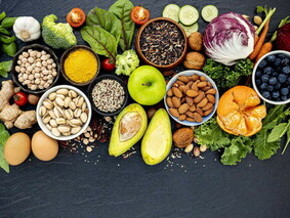
My breast milk: the best kind of food
Breast milk contains everything: it meets the nutritional needs of new-born child, and its composition changes with the passage of months and with the change of the child's needs.
By breastfeeding, you offer your baby a meal of exactly 3 portions, which contains everything he needs for his intensive growth during the first few weeks. In fact, mother's breast milk adapts over time to the needs of the baby as he gets older. Evidence for this is that women who have premature births produce milk that is full of essential fatty acids to meet the requirements of the preterm baby in terms of brain maturity.
The three stages of the mother's breast milk.
The composition of the milk changes with the passage of days and weeks.
• The first few days: After birth, the baby is fed milk that turns yellow in colour and is easy to digest. This milk is called Colostrum, and this is what the mother produces from the beginning of the second trimester of pregnancy, and it remains rich in proteins and antibodies, and is considered the favourite food of the unborn child. Other than that, it helps the baby pass his first stool, and then you must give him milk in large quantities and as soon as possible. Do not worry if the amount of Colostrum milk is little (between 20 and 40 ml per feeding): because it comes out accurately with the baby's needs when it is born.
• From the third day until the 14th day: The Colostrum disappears, and the transitional milk comes in its place. This is a liquid of orange colour and contains less proteins, higher lactose (sugar), lipids (fats) and calcium. This is known as "flowing" milk, meaning that you start producing milk in larger quantities. How can you know this? You will feel warm, and your chest will dry out and harden, and you may feel a crackling sensation.
Note: The more you breastfeed, the more milk you will have.
• At the end of the second week: your milk will be “mature” and take a bluish-white colour and be a little transparent, and it will contain everything the child needs for his growth: water, proteins, carbohydrates (90% of which is lactose for brain development), and fats (such as essential fatty acids), minerals (calcium, iron, phosphorous, etc.) and Vitamins of each group. That is why it is best that you keep taking Vitamin D supplements during pregnancy and Vitamin K after birth. (Consult your doctor or gynaecologist).
All in one, a well-balanced meal
• Believe it or not, breast milk changes in colour and viscosity from week to week, but this also happens according to the time of day, even over the course of one feeding!
That is why you will find that milk is higher in lactose in the morning, fats in the middle of the day, and proteins at night. This is one of the most important reasons that your child breastfeeds whenever he wants in terms of the number of times or duration, for him to take all the nutrients he needs to grow up.
• Your milk also adapts to your baby's desires, which change over the course of the feeding. At the beginning, the milk will be semi-transparent, and full of water and sugar to calm the hunger and thirst of your child, and when the child breastfeeds, the milk becomes more and more rich in fats and proteins because of the energy he needs to grow. At the end of the feeding, the level of fat in the milk increases four times to meet the baby’s craving, your baby will learn how to regulate his appetite, so it is also important that you let your baby breastfeed until he leaves your breast, and this means that it is time to go to the second breast or simply the end of the feeding.
Mother's breast milk adapts to her needs, too.
Are you expecting twins? If this is the case, do not worry that your body will be able to breastfeed two children at the same time, because then you will produce almost twice the amount of milk. If for any reason you are not able to breastfeed, the breast you breastfeed from will double its energy and if you are following a balanced diet, milk will be ideal for your baby's needs. Note that drinking milk does not increase your milk production!
The only rule is that you let your baby take the lead when the issue remains related to breastfeeding. Believe in yourself and in your child.

















